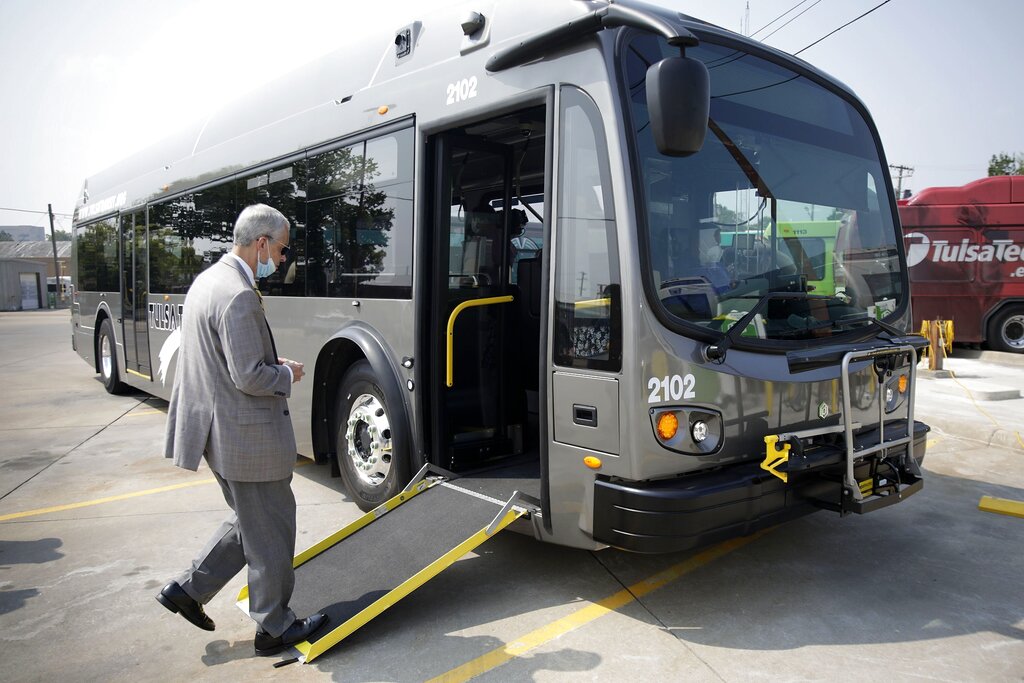General News
Meropi Kyriacou Honored as TNH Educator of the Year
NEW YORK – Meropi Kyriacou, the new Principal of The Cathedral School in Manhattan, was honored as The National Herald’s Educator of the Year.

WASHINGTON — Public transit systems straining to win back riders after being crushed by the COVID-19 pandemic are getting a $3.7 billion boost to stay afloat and invest in new fleets of electric buses.
With mask restrictions fading and workers beginning to return to offices, the Biden administration said Monday it was awarding $2.2 billion in coronavirus relief money from the American Rescue Plan to 35 financially strapped transit agencies in 18 states. The money would be used to prop up day-to-day operations, including staffing and payroll as well as cleaning and sanitization to limit the spread of illness in public transportation. A federal mask mandate for public transit remains in effect until at least March 18.
Another $1.5 billion in grants will be made available under President Joe Biden’s infrastructure law — a total of $7.5 billion over five years — for transit agencies to purchase low- or no-emission buses and build bus facilities. That’s more than double the combined amount from the previous year.
Transit agencies will have until May to apply for the Transportation Department’s infrastructure grants, which will be awarded by fall. About 5% of the money must be used for workforce training to help transit workers prepare for the technological change.
“We’re making the largest ever investment in this program for buses and bus facilities, helping to deliver better commutes and cleaner air to American communities,” Transportation Secretary Pete Buttigieg said.
Buttigieg joined Vice President Kamala Harris and Environmental Protection Agency Administrator Michael Regan at the White House on Monday to unveil a range of actions to promote green friendly transit and protect health. They included proposed stronger pollution regulations for new tractor-trailer rigs that would clean up smoky diesel engines as well as $17 million in funding for school districts to buy electric zero-emission and low-emission school buses. The emissions can cause respiratory problems in humans.
Several transit systems have already been moving in the direction of electric buses. California has committed to all-electric bus fleets by 2040, as well as New York City and Boston. Washington, D.C., has set a target of 2045. Transportation is the biggest U.S. contributor to global warming.
The effort comes at a challenging time for public transit.
Only about 55% of transit riders nationwide have returned compared with pre-pandemic times, according to the American Public Transportation Association. The biggest losses have been in commuter rail systems serving white-collar suburbanites traveling to downtown workplaces.
As COVID-19 cases decline, Biden has urged Americans to shed remote work, describing a return to offices as necessary to boost economic growth. Last week, the Centers for Disease Control and Prevention said about 90% of the U.S. population lives in counties where the risk of the coronavirus is posing a low or medium threat, meaning residents don’t need to wear masks in most indoor settings.
“It’s time for America to get back to work and fill our great downtowns again with people,” Biden said in his State of the Union address.
Among the recipients of COVID-19 relief funds Monday were big-city transit systems that had been hit hard from revenue losses due to decreased ridership. New York City’s transit system, the nation’s largest, garnered $769 million to steady its operations, while San Francisco’s Bay Area Rapid Transit got $270 million to bolster service and safety protocols.
Others receiving grants were the Washington, D.C., metro system at $120 million as it anticipates a return of federal employees to offices and Houston’s public transit at $137 million, which has significantly added rapid transit bus lines.
“These funds are crucial to avoid drastic service cuts and layoffs that would damage the economy and public health,” said Nuria Fernandez, head of the Federal Transit Administration, which oversees the grants.
At the start of the pandemic, transit agencies cut payroll and slashed services. That came even as essential workers, who are disproportionately nonwhite and lower income, continued to rely on public transportation to get to work. But three rounds totaling nearly $70 billion in federal COVID-19 emergency assistance, including $30.5 billion that Biden signed into law last year, pulled transit agencies from the brink of financial collapse.
“The COVID funds will be vital to keeping workers connected to their offices, but, even more importantly, the long-term funds in the bipartisan infrastructure bill will provide generational change,” said Paul P. Skoutelas, president of the American Public Transportation Association. He said the money will allow transit systems “to re-evaluate routes and service plans, address equity issues and place more alternative fuels vehicles on the road to help address our global climate crisis.”
NEW YORK – Meropi Kyriacou, the new Principal of The Cathedral School in Manhattan, was honored as The National Herald’s Educator of the Year.

MELBOURNE, Australia (AP) — More than 100 long-finned pilot whales that beached on the western Australian coast Thursday have returned to sea, while 29 died on the shore, officials said.
Some of us await the day we retire with greater impatience, others with less.
Washington, DC – A special concert by Mario Frangoulis’ launched the Golden Jubilee Weekend celebrations for the American Hellenic Institute (AHI) at the famed Warner Theater in Washington, DC on April 12.
LORAIN, OH – Fr. Michael Gulgas, 67 of Amherst, fell asleep in the Lord, on the mid-Lenten celebration of the Holy Cross in St.